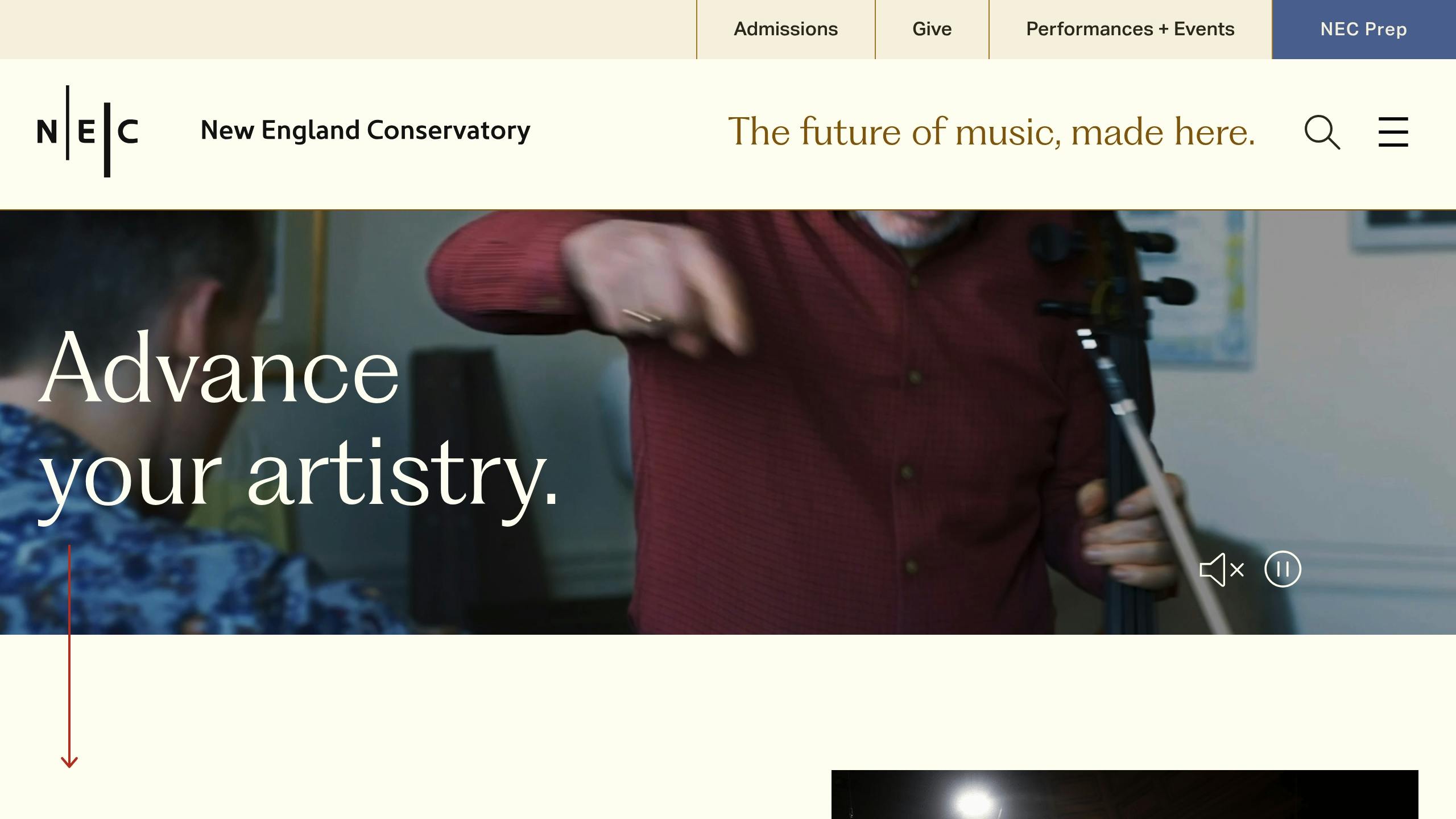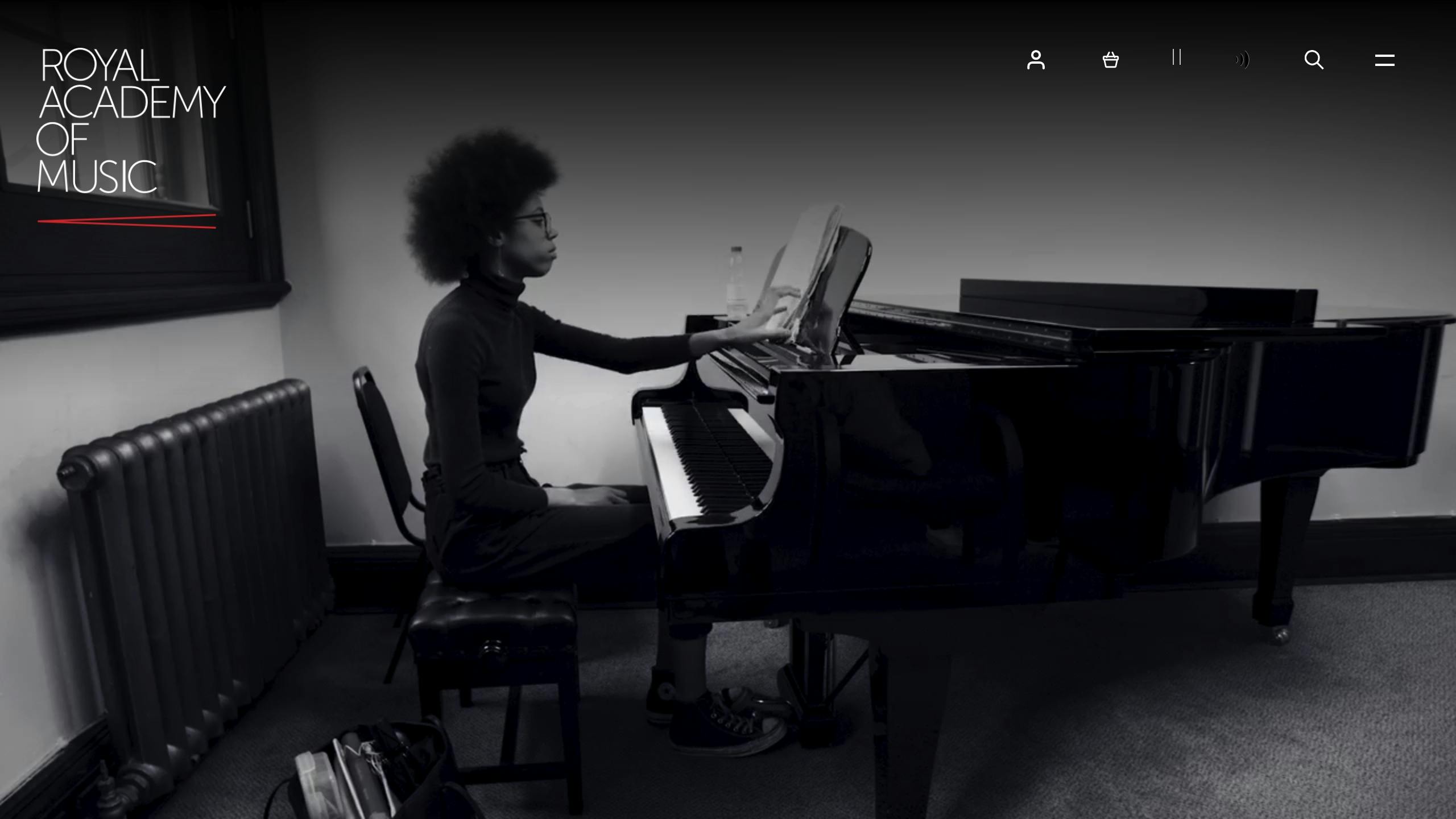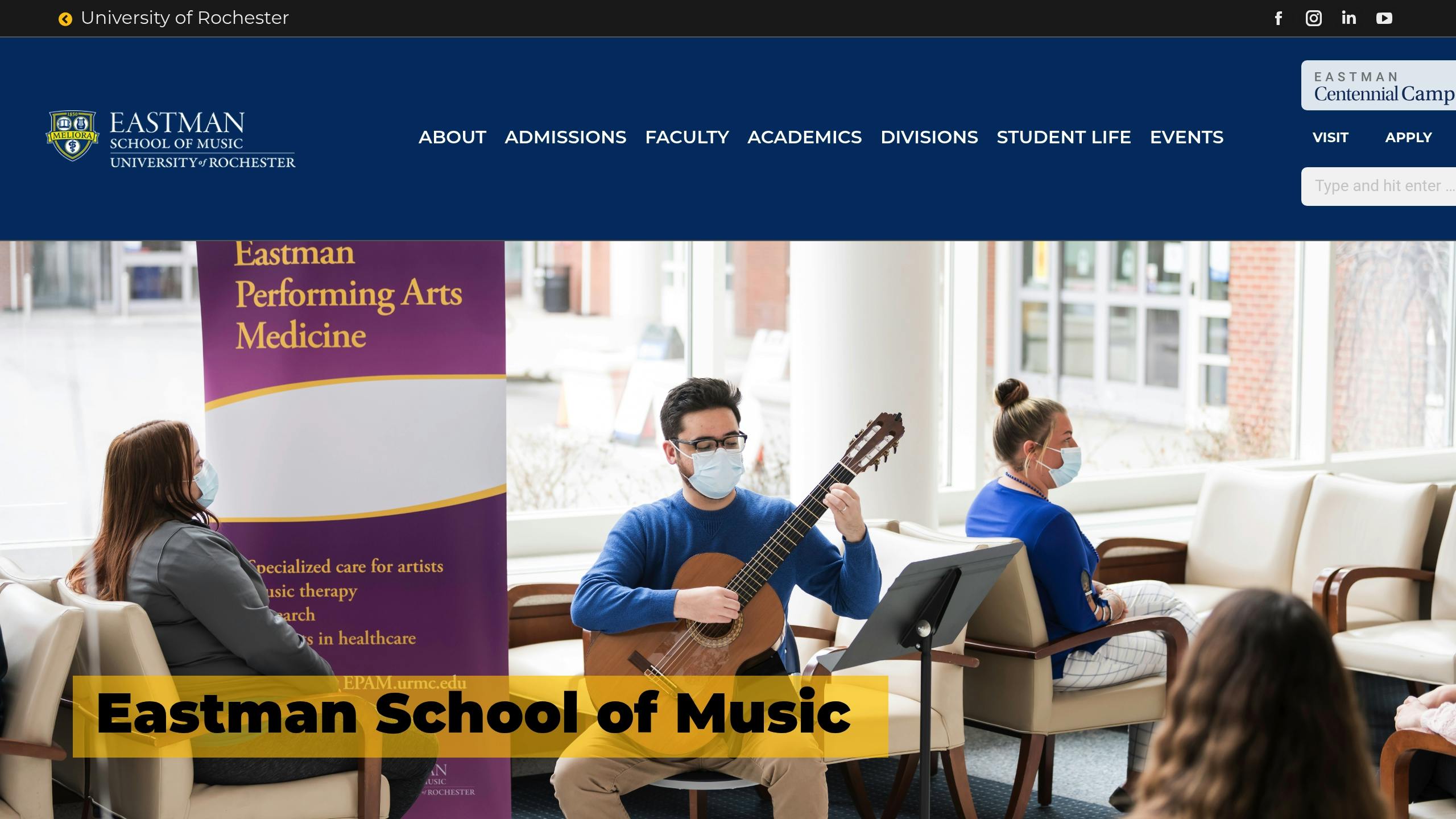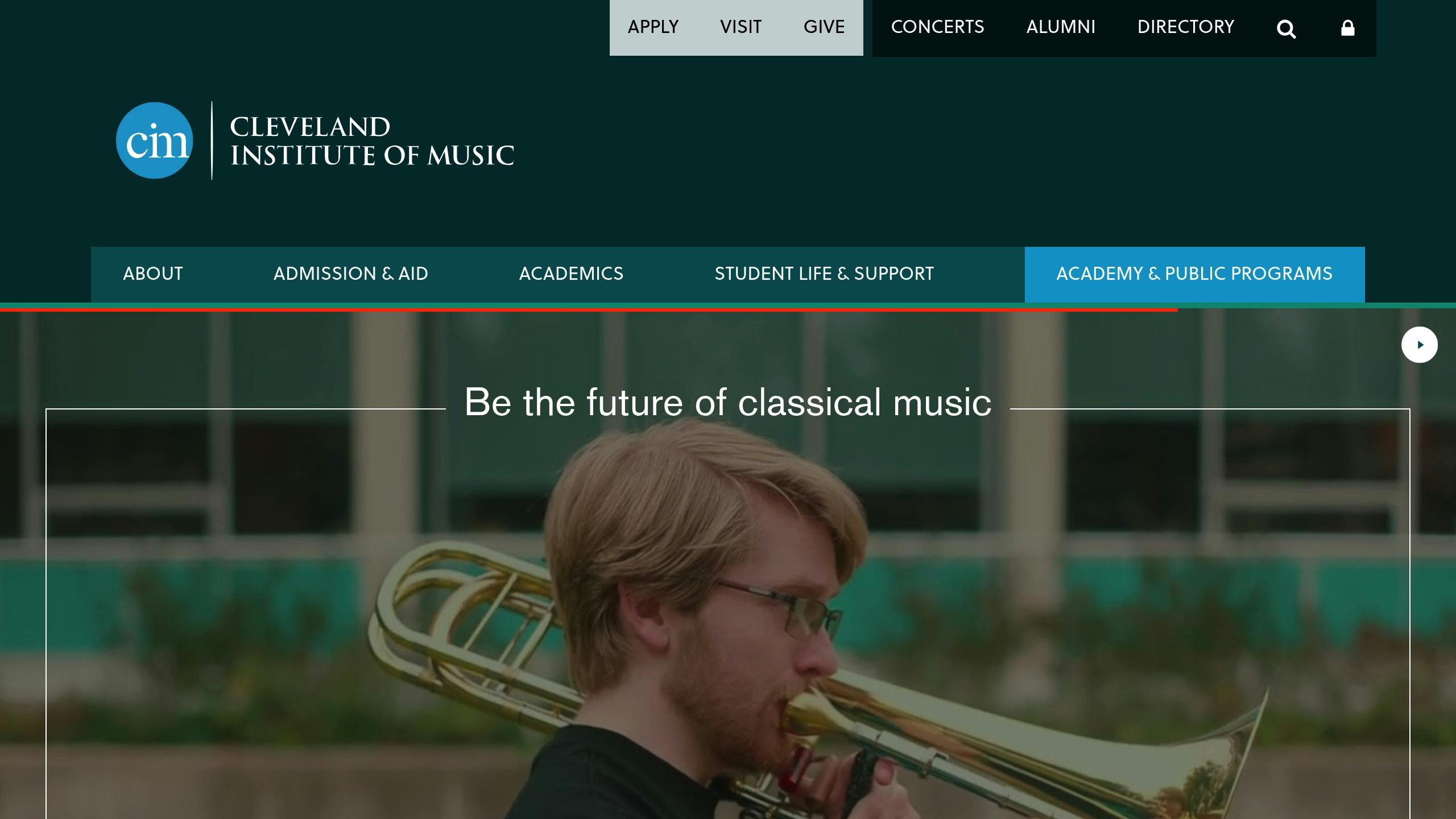Here’s a quick guide to the 10 best collaborative piano programs worldwide. These programs combine technical training, performance opportunities, and mentorship to prepare pianists for careers in vocal, instrumental, and chamber music collaboration.
Quick Highlights:
- Juilliard School (NYC): Hands-on performance in NYC’s top venues.
- New England Conservatory (Boston): Small class sizes with personalized coaching.
- Guildhall School (London): Strong focus on accompaniment and ensemble work.
- Hochschule für Musik (Munich): Emphasis on German art songs and chamber music.
- Royal Academy of Music (London): Vocal accompaniment and chamber music focus.
- Manhattan School of Music (NYC): Industry connections in NYC’s vibrant music scene.
- University of Michigan (Ann Arbor): Cross-disciplinary collaboration opportunities.
- CNSMDP (Paris): Specialized in French art song and diction.
- Eastman School of Music (Rochester): Close work with vocal and instrumental departments.
- Cleveland Institute of Music: Focused mentorship and modern performance tools.
What to Look For:
- Faculty Mentorship: Learn from active performers and educators.
- Performance Opportunities: Regular chances to perform in top venues.
- Specialized Training: Programs tailored to vocal, instrumental, or chamber collaboration.
- Career Development: Workshops on networking, marketing, and professional growth.
Choose the program that aligns with your career goals, whether it’s opera, chamber music, or vocal accompaniment. Explore each program’s unique strengths to find the right fit for your aspirations.
Collaborative Piano Studies at NEC
1. The Juilliard School (New York, USA)
The Juilliard School stands out for its top-tier collaborative piano program. Situated at Lincoln Center, it offers an in-depth education tailored for pianists aiming to work with vocalists and instrumentalists. The Master of Music in Collaborative Piano is designed to develop the skills and artistry needed for successful collaborations. The program also emphasizes hands-on performance opportunities.
Students gain experience by performing in various Juilliard venues, helping them adapt to different acoustic settings. Lessons, ensemble work, and workshops are led by highly regarded performing faculty, ensuring personalized and practical training.
The program works closely with the vocal and instrumental departments, creating a professional and immersive collaborative environment. Being in New York City, students are surrounded by a thriving musical culture, with access to iconic venues like Carnegie Hall and the Metropolitan Opera.
2. New England Conservatory (Boston, USA)
Founded in 1867, the New England Conservatory (NEC) is home to a highly regarded collaborative piano program. Known for its one-on-one instruction and small class sizes, NEC provides an intimate learning environment for its students.
Each year, only 6–8 students are admitted to this program, where they receive guidance from esteemed faculty through small-group coaching, masterclasses, and workshops. The program combines rigorous vocal and instrumental training with plenty of performance opportunities, ensuring every student gets personalized attention.
Students frequently perform in NEC’s Jordan Hall, a 1,013-seat venue celebrated for its outstanding acoustics. This real-world performance experience is a key part of the curriculum, which also includes weekly studio classes, chamber ensembles with string and wind players, opera coaching, art song interpretation, and professional development workshops.
Located in Boston, NEC students are immersed in a vibrant musical scene. They can attend performances at Symphony Hall and the Boston Opera House and benefit from partnerships with the Boston Symphony Orchestra and Boston Lyric Opera‘s young artist programs.
NEC graduates have gone on to thrive in opera companies, conservatories, and chamber music festivals across the country. With its focus on performance skills and career readiness, the program equips students for a wide range of opportunities in collaborative music.
3. Guildhall School of Music & Drama (London, UK)
The Guildhall School of Music & Drama ranks among Europe’s top institutions for collaborative piano studies. Its program blends one-on-one instruction with frequent performance opportunities on campus, focusing on developing accompanists and chamber musicians. Students benefit from guidance provided by a faculty of seasoned professionals.
This program combines performance training with academic studies, offering opportunities to work closely with the vocal and opera departments. This approach helps students refine their skills in accompaniment and ensemble playing.
Located in the heart of London, the school immerses students in a dynamic music environment filled with masterclasses, public recitals, and career development opportunities. The program concludes with a final recital that highlights students’ range and expertise. Many alumni go on to successful careers as freelance collaborative pianists or secure positions with opera companies and conservatories.
4. Hochschule für Musik und Theater München (Munich, Germany)
Located in Germany, the Hochschule für Musik und Theater München (HMTM) stands out as one of the country’s top music schools. Its collaborative piano program is deeply rooted in European tradition, emphasizing both vocal and instrumental accompaniment. Special attention is given to German art songs and chamber music, reflecting the school’s dedication to these genres.
The program blends performance training with theoretical studies, offering students plenty of opportunities to perform in Munich. A strong emphasis on historical practices further refines their skills and understanding of accompaniment.
Graduates leave the program ready to build careers within established institutions or as freelance collaborative artists.
5. Royal Academy of Music (London, UK)
Established in 1822, the Royal Academy of Music (RAM) in London combines classical training with contemporary performance techniques, offering a standout program in collaborative piano.
The program focuses on building skills essential for musical partnerships, including vocal accompaniment, chamber music, and score interpretation. Through masterclasses and specialized courses, students refine their technical abilities and artistic expression. This intense training is complemented by hands-on performance opportunities.
Situated in the heart of London, RAM provides access to a vibrant classical music community. Students regularly engage with experienced professionals and perform in various settings, paving the way for successful careers across Europe and North America.
sbb-itb-b8bc1ab
6. Manhattan School of Music (New York, USA)
Founded in 1917, the Manhattan School of Music (MSM) provides a collaborative piano program that blends technical training with hands-on performance experience. This program is designed to prepare students for careers as accompanists and chamber musicians.
Based in New York City, MSM takes full advantage of the city’s dynamic music scene. Students gain access to numerous performance opportunities and build valuable industry connections. The program is further enriched by its faculty – experienced performers who offer personalized guidance to help students develop their craft and professional skills.
7. University of Michigan (Ann Arbor, USA)
The University of Michigan’s School of Music, Theatre & Dance offers a well-rounded collaborative piano program with a detailed and hands-on curriculum. Based in Ann Arbor, the program blends strong technical training with abundant performance opportunities, all supported by state-of-the-art facilities.
The Collaborative Piano Studio includes 24 practice rooms, each equipped with Steinway pianos and recording tools. Students also participate in weekly masterclasses held in the 250-seat Britton Recital Hall, helping them refine their performance abilities.
One standout aspect of this program is its cross-disciplinary focus. Students work closely with vocalists, instrumentalists, and dancers, while also collaborating with local organizations such as the Ann Arbor Symphony Orchestra and the University Musical Society.
The faculty, known for their expertise, provide one-on-one mentorship and small-group sessions. These are further enhanced by workshops that cover career essentials like entrepreneurship, digital marketing, and professional networking.
Graduates of the program often secure roles at top institutions across the country, a testament to the program’s effectiveness. The curriculum includes both classic and modern works, ensuring students develop a broad set of collaborative skills.
The annual Ann Arbor Piano Festival brings together leading artists for workshops and performances, giving students valuable networking opportunities and exposure to a variety of performance styles.
8. Conservatoire National Supérieur de Musique et de Danse de Paris (Paris, France)
The Conservatoire National Supérieur de Musique et de Danse de Paris (CNSMDP) offers an esteemed collaborative piano program. Situated in Paris, the program highlights the rich heritage of French music while incorporating global elements.
The program emphasizes collaboration across disciplines, with regular chamber workshops designed for both vocal and instrumental partnerships. Students develop critical skills like sight-reading and score reduction, laying a strong technical foundation.
Frequent performance opportunities and masterclasses with guest artists help students gain valuable stage experience. With small class sizes, the experienced faculty provides tailored mentorship to each student.
A key focus of the program is the study of French mélodie and art song, with an emphasis on mastering French diction and performance techniques. This specialized training equips graduates for successful careers in art song and chamber music collaboration on an international level.
9. Eastman School of Music (Rochester, USA)
Part of the University of Rochester, the Eastman School of Music offers a Master of Music in Collaborative Piano that combines in-depth technical training with plenty of performance opportunities. The program’s curriculum is designed to ensure students gain practical experience while honing their craft.
Students benefit from top-tier venues that host regular collaborative events. The program emphasizes working closely with vocal and instrumental departments through studio classes, chamber ensembles, and opera productions. With limited enrollment, the program ensures each student receives personalized attention and guidance.
Performance opportunities extend beyond campus, with students frequently collaborating with local professional groups like the Rochester Philharmonic Orchestra and Finger Lakes Opera. The faculty, made up of active performers and educators, provides private lessons and organizes workshops aimed at improving performance skills and building professional connections.
Graduates of this program have secured roles at respected institutions and opera companies across the U.S. Students also have access to an impressive collection of high-quality pianos and well-maintained practice spaces, helping them grow as skilled collaborative artists.
10. Cleveland Institute of Music (Cleveland, USA)
The Cleveland Institute of Music (CIM) offers a focused collaborative piano program that emphasizes personalized mentorship and a wide range of performance opportunities. Students benefit from access to top-tier facilities and Cleveland’s vibrant concert venues, honing their skills in ensemble performance.
CIM’s faculty, who are both seasoned performers and passionate educators, provide one-on-one coaching and lead workshops on topics like art song interpretation, chamber music, and career development. These sessions are designed to deepen students’ expertise and prepare them for professional challenges.
Situated in University Circle, CIM connects students to Cleveland’s rich musical history. With frequent masterclasses and performances near iconic locations like Severance Hall, the program immerses participants in a thriving cultural environment. Recent updates to the curriculum also include digital performance tools and career-focused workshops, ensuring graduates are equipped for the modern music world.
CIM alumni often secure positions with prestigious musical organizations, a testament to the program’s commitment to artistic growth and career preparation.
Conclusion
The top 10 programs highlighted above stand out in collaborative piano education, combining expert mentorship, abundant performance opportunities, and specialized training to prepare students for successful careers.
Here’s a quick breakdown of their standout features:
- Faculty Mentorship: These programs are led by experienced mentors who are active performers and educators, offering invaluable guidance.
- Performance Opportunities: Many programs take full advantage of their location, providing students with regular chances to perform in vibrant music scenes.
- Specialized Training: Each program has its own focus. For example, the Royal Academy of Music is renowned for art song collaboration, while the University of Michigan excels in opera coaching.
- Career Development: Career readiness is a priority, with programs like the Cleveland Institute of Music incorporating modern industry practices and tools into their training.
- Location and Musical Community: A program’s setting plays a critical role. Cities like Paris, London, and New York offer rich cultural experiences and access to diverse musical traditions and performance spaces.
When choosing a program, align it with your career goals – whether that’s chamber music, vocal accompaniment, or opera coaching. Visiting programs during the academic year can give you a better sense of their environment and allow you to connect with faculty and students.
Collaborative piano education is where tradition meets modern demands. These programs provide the foundation and tools needed to carve out your own artistic path.










